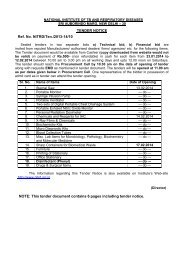The Indian Journal of Tuberculosis - LRS Institute of Tuberculosis ...
The Indian Journal of Tuberculosis - LRS Institute of Tuberculosis ...
The Indian Journal of Tuberculosis - LRS Institute of Tuberculosis ...
Create successful ePaper yourself
Turn your PDF publications into a flip-book with our unique Google optimized e-Paper software.
Original Article<br />
PRIVATE SECTOR INVOLVEMENT IN TUBERCULOSIS CONTROL<br />
IN CHANDIGARH<br />
J S Thakur 1 , Sitanshu Sekhar Kar 2 , Alka Sehgal 3 and Rajesh Kumar 4<br />
(Original received on 22.11.2005; Revised Version received on 9.3.2006; Accepted on 4.4.2006)<br />
Summary<br />
Background: Private practitioners in India treat a substantial proportion <strong>of</strong> the TB cases. <strong>The</strong> present study is an attempt to<br />
find out the extent <strong>of</strong> private sector involvement in the control <strong>of</strong> tuberculosis in the Union Territory <strong>of</strong> Chandigarh.<br />
Methodology: <strong>The</strong> study was conducted in Union Territory <strong>of</strong> Chandigarh, during 2003-04. This study was a cross-sectional<br />
study involving 20 per cent <strong>of</strong> private practitioners practising allopathic system <strong>of</strong> medicine in Chandigarh. A questionnaire was<br />
used for collection <strong>of</strong> data after pre-testing.<br />
Results: Out <strong>of</strong> 114 doctors interviewed, 71 per cent dealt with TB patients. In response to a question as to how many sputum<br />
samples were required for routine microscopy, 72 per cent stated 3 samples but only 6 per cent knew the correct timing <strong>of</strong> sputum<br />
collection. 8.6 per cent <strong>of</strong> the practitioners followed the recommended guidelines <strong>of</strong> RNTCP treatment. As to reasons for not<br />
following the standard guidelines, 46.6 per cent said that they were not aware <strong>of</strong> these guidelines. About 82 oer cent were willing to<br />
be partners for implementation <strong>of</strong> RNTCP. A case history was given to practitioners to assess their knowledge regarding DOTS. It<br />
was observed that only 7.8 per cent knew the correct dosage and 21per cent knew the correct duration <strong>of</strong> treatment.<br />
Conclusion: Knowledge <strong>of</strong> private practitioners regarding RNTCP and DOTS strategy was poor and they were not following recommended<br />
guidelines for control <strong>of</strong> tuberculosis, but they were willing to participate in the programme. [<strong>Indian</strong> J Tuberc 2006; 53:149-153]<br />
Key Words: <strong>Tuberculosis</strong>, Private practitioner, Knowledge, RNTCP, TB.<br />
INTRODUCTION<br />
<strong>The</strong> private sector accounts for 82 per cent<br />
<strong>of</strong> all out patient visits at the all India level, with no<br />
significant variations by income group 1 . Suspected<br />
TB patients also first approach private sector. Private<br />
practitioners in India treat over half <strong>of</strong> the TB cases 2 .<br />
In many parts <strong>of</strong> India, the private sector has still<br />
remained alienated from DOTS implementation; hence<br />
case detection has remained low in many <strong>of</strong> these<br />
regions. Unfortunately, case management practices<br />
in the private sector overly rely on X-ray and<br />
treatments too <strong>of</strong>ten are based on unproved and<br />
untested regimens 2 .<br />
For national programme to broaden its reach<br />
and have maximal impact, the involvement <strong>of</strong> private<br />
practitioners assumes great importance. It is one <strong>of</strong><br />
the big challenges to policy makers in India to ensure<br />
their participation, which is intimately linked with<br />
the success <strong>of</strong> the programme. Hence, present study<br />
is an attempt to observe the extent <strong>of</strong> the private<br />
sector involvement in implementation <strong>of</strong> Revised<br />
National <strong>Tuberculosis</strong> Control Programme (RNTCP)<br />
in the Union Territory <strong>of</strong> Chandigarh.<br />
MATERIAL AND METHODS<br />
<strong>The</strong> study was done in the Union Territory<br />
<strong>of</strong> Chandigarh during the year 2003 - 04. This was a<br />
cross-sectional study involving 20% <strong>of</strong> the private<br />
practitioners, who are practising allopathic system<br />
<strong>of</strong> medicine in Chandigarh. Since the data about the<br />
involvement <strong>of</strong> private practitioners in RNTCP for<br />
Chandigarh was not available when the study was<br />
planned, a sample <strong>of</strong> 20% practitioners was taken<br />
randomly for further study. A list <strong>of</strong> all doctors<br />
practising in allopathic system <strong>of</strong> medicine was<br />
obtained from the <strong>Indian</strong> Medical Association (IMA),<br />
Chandigarh branch. A questionnaire was used after<br />
1. Assistant Pr<strong>of</strong>essor 2. Junior Resident 3. Senior Lecturer* 4. Pr<strong>of</strong>essor & Head<br />
School <strong>of</strong> Public Health, Department <strong>of</strong> Community Medicine, Post Graduate <strong>Institute</strong> <strong>of</strong> Medical Education and Research, Chandigarh.<br />
* Department <strong>of</strong> Obstetrics & Gynaecology, Government Medical College and Hospital, Chandigarh.<br />
Correspondence: DR. J.S. Thakur, Assistant Pr<strong>of</strong>essor, Department <strong>of</strong> Community Medicine, PGIMER, Chandigrah – 160012; E-Mailjsthakur_in@yahoo.co.in<br />
<strong>Indian</strong> <strong>Journal</strong> <strong>of</strong> <strong>Tuberculosis</strong>
















